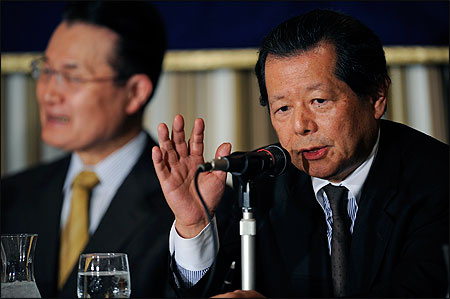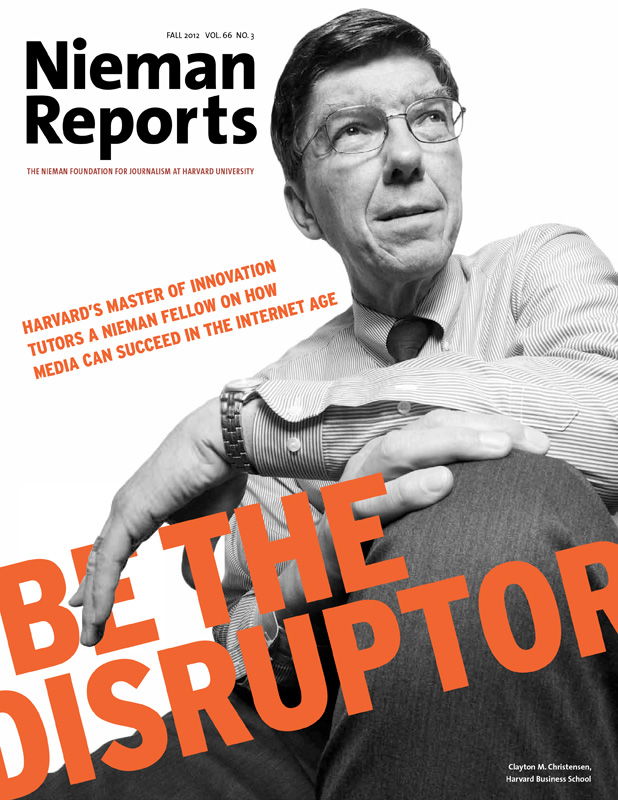Following the accident at the Fukushima Daiichi nuclear plant in March 2011, Japan faced a crisis of confidence of epic proportions: How could an advanced nation suffer such a nuclear disaster? How had an entire nation been lulled into believing the "myth of [nuclear power’s] absolute safety"? Why hadn’t journalists asked tougher questions and probed more deeply?
Yoichi Funabashi, who retired in 2010 as editor in chief of The Asahi Shimbun, saw the need for an independent investigation into the causes and consequences of the disaster. He joined with colleagues to form the Rebuild Japan Initiative Foundation, funded by private individuals and companies, including Takeda Pharmaceutical Co. and the LawsonInc. retail chain.
The foundation’s 420-page analysis disclosed that Japan’s government had prepared a secret report during the accident describing a worst-case scenario—a massive radioactive release that, if carried toward Tokyo, might have warranted the evacuation of 30 million residents. The report also concluded that Japan’s government and plant owner Tokyo Electric Power Co. (Tepco) were "astonishingly unprepared" for an earthquake or tsunami.
Funabashi, a 1976 Nieman Fellow, was interviewed by Nieman classmate Peter Behr about lessons for the media. Behr, who retired from The Washington Post where he covered energy, reports for EnergyWire, an online news service of E&E News. He covered the Fukushima Daiichi accident and its aftermath for E&E News. Edited excerpts of their conversation follow:

Yoichi Funabashi was instrumental in the mounting of an independent analysis of the Fukushima nuclear disaster in Japan. Photo by Franck Robichon/European Pressphoto Agency/Corbis.
Peter Behr: Who conducted the investigation and who did they interview?
Yoichi Funabashi: We had a working group of 30 investigators that included lawyers and scholars. We were also greatly helped by three journalists—who work at major media companies in Japan—whose names are not public. We managed to interview more than 300 people, including former Prime Minister Naoto Kan and other top government officials and regulators, as well as police and self-defense forces. We were not able to interview the five top Tepco officers and managers. We tried very hard. We were refused. However, we were able to interview several Tepco employees and former top managers.
What were the most important findings?
We are very confident of our determination that the Kan government had drawn up a report sketching out a worst-case scenario. That shows how very dire the prime minister and colleagues perceived the situation to be, even though they tried to calm the public and downplay the gravity of the disaster.
Also, they were extremely concerned about the structural integrity of the spent fuel pools, because if that structure collapsed completely, a massive amount of radiation would have been released. Fortunately, it did not happen that way, but it was a keen reminder of how critical the situation was.
In what ways did your report differ from the government’s initial report?
We tried to dig deeper into the historic and structural factors behind the accident. For instance, in the relationship between the regulator and regulated [company], the regulated had the upper hand due to their political clout, and so, in a way, the regulator was held captive.
And we put that in a historic perspective: why Japan, which had experienced a nuclear bomb in 1945, and whose people had developed such an intense allergy to nuclear power, came to depend on nuclear energy to a great extent. And how what we called the "myth of absolute safety" evolved over the past 30 to 40 years.
At the same time, we also focused on how vulnerable people were in the face of radiation, particularly the weak and infirm. The evacuation of one hospital took a long time because most of the patients were very ill, and, in the process, 50 people died. We actually were the first to focus on that.

Hospital patients who might have been exposed to radiation during the Fukushima nuclear accident are brought to a community center for testing. Photo by Daisuke Tomita/The Yomiuri Shimbun/The Associated Press.
What were the major shortcomings in Japanese press coverage of the nuclear power industry and the associated public safety issues before the Fukushima disaster?
I think the Japanese media did a very poor job of covering the multiple stakeholders on nuclear energy. They certainly covered the regulator, operators and policymakers but they did not cover ordinary citizens or municipalities and their stakes in the issue.
The first responders—firefighters, police, for example, or medical doctors in the hospitals near the area—they are the ones who suffer most if nuclear accidents should happen. It was really a rude awakening to all of us how important it is to cover those stakeholders. The media—particularly Tokyo-based media—did not reach out to people on the ground before the crisis. That is a serious problem.
Your investigation noted that studies had identified a risk of large tsunamis at Fukushima, but those risks were dismissed because addressing them would challenge what you call the "myth of absolutely safety" surrounding Japan’s nuclear industry. Was this also a failure of oversight by Japan’s media?
Some scholars strongly argued for beefing up the sea wall and taking other steps. Perhaps we have been too complacent. We are very proud of our image as a "safe country," but we failed to ask critical questions. At the same time, we have to remember how difficult it is for reporters to penetrate the inner workings of Tepco.
We opened a whistle-blowing Web channel when we established our investigation commission. We received dozens of tips from Tepco subcontractors. To be honest, we did not get any whistle-blower information from Tepco employees. Tepco is so close-knit and so difficult to penetrate. Even after Tepco has been de facto nationalized, it still insists that most of its video conferences—the conversations between headquarters in Tokyo and Fukushima Daiichi—be kept secret.
I really wish that professional journalists had penetrated Tepco management. More than a year after the accident, we still do not have any serious investigative reporting on Tepco: how Tepco’s top management responded to the crisis; what kind of views did they have and what kind of decisions did they make. It’s still so murky.
What did you think of the U.S. coverage of the Fukushima disaster?
The U.S. media covered Fukushima pretty well. The New York Times did a superb job. They were very attuned to the serious consequences of the accident from the early days on, and they focused on people in a very vivid way.
Some U.S. media were sensational, particularly in the very early stages, without, I suspect, solid evidence. Ironically, I think the sensational reports proved to be right, because the situation was so serious.
Do you see lessons learned for the U.S. press?
In the early stages, I think it’s very important for the media to ask the critical questions, not pretend they know the answers.
Perhaps a second lesson is that the news media—particularly traditional media—should reach out to bloggers and tweeters and get a much greater diversity of information.
There is a lot of noise, of course, among those bloggers, tweeters and others, but in the Fukushima case, it turned out that some blogs and tweets were diamonds: they were clear signals among all the noise.
I think the critical role for reporters and editors during a time of crisis is to differentiate the signal from the noise and determine which signal is the most crucial one. That requires a great deal of professionalism, and, particularly in technical matters, a high level of expertise. It is a crucial role that traditional media can and should play. I think the U.S. media is much farther ahead in this regard.
Some other nations joining the "nuclear club" now do not have a strong press or politically independent regulators. Does the Fukushima accident hold lessons for them?
I am very concerned about that. In those countries, you cannot count on governmental oversight. They need an independent media as a watchdog, particularly on public safety issues regarding nuclear energy.
I think that the media should keep asking critical questions. That is one of the lessons we learned: Japan’s media did not try hard enough to identify the risks of nuclear power.
In some cases, exposing those risks would provoke public anxiety so you have to be very careful in presenting information, but at the same time you have to ask the right questions: how much risk, what kind of risks. That must come first.
I really hope that in those countries—Vietnam, China, India, Turkey,the United Arab Emirates, and many other countries that will follow in 10 years or 20 years—independent media and journalism will exist. Otherwise, I think it will be extremely dangerous.


